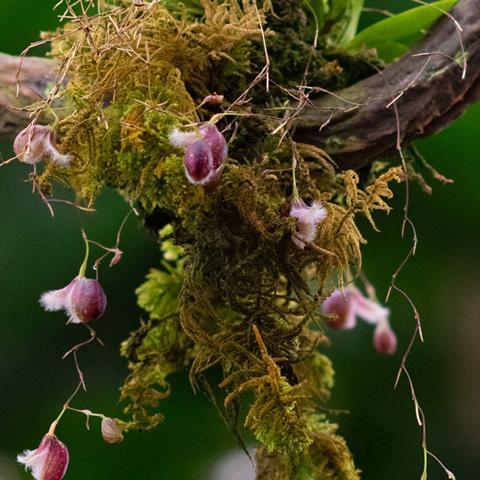By Tim Steinweg, PRI Head of Stewardship - Nature

Last December, the COP28 climate summit marked a global recognition of the nexus between climate change and biodiversity loss. The Joint Statement on Climate, Nature and People called for a unified approach to meeting the targets of the Paris Agreement and the Kunming-Montreal Global Biodiversity Framework and proposed a whole-of-society approach to developing climate and nature policies.
Investors can play a key role in contributing to the objectives of these global agreements, and collaborative stewardship initiatives are an effective and efficient tool to do so.
Spring, PRI’s stewardship initiative on nature, provides an opportunity for PRI signatories to engage with influential companies on their impacts and dependencies on the natural world; through their business operations, their supply chains, and their engagement with policy makers. Spring is currently endorsed by 129 PRI signatories who have publicly signalled their support for the objectives and strategy of Spring. Current endorsers represent a combined estimated USD 9 trillion Assets Under Management.
Ultimately, Spring is intended to facilitate increased action and momentum from the investment community towards halting and reversing biodiversity loss by 2030.
The first batch of focus companies
Today, PRI releases a first batch of 40 companies that will be engaged through Spring. This set of companies was selected through an in-depth analysis that aimed to identify the most influential companies in the relevant policy processes that shape the dynamics of land use in key geographies. Responsible practices by these companies may help protect important and sensitive biomes, including the Amazon, Grand Chaco and Cerrado in Latin America and tropical forests in Indonesia.
The companies are based in a wide range of locations, including in emerging markets, and come from a variety of sectors that are directly or indirectly exposed to deforestation risks. As such, Spring offers complementary engagement opportunities to existing nature-related stewardship initiatives. PRI intends to release a second batch of companies later in 2024.
Sectors represented in the focus company list include food and agriculture - the single largest contributor to forest loss and land degradation in recent decades - but also mineral mining, automotive, chemicals and banks.
In-depth company selection methodology
Our company selection methodology was developed in partnership with consultancies Canbury Insights and Acrux Partners. The methodology aimed to identify the companies that exert influence in policy processes that affect forest loss and land degradation in priority geographies. The methodology consisted of three main phases:
- Phase 1 aimed to identify the priority geographies that face high risk of future forest loss and land degradation, and where interventions may have the highest potential of real-world impacts.
- Phase 2 aimed to identify the most important policy processes that shape the dynamics of forest loss and land degradation in the above-mentioned priority geographies.
- Phase 3 aimed to identify the most influential corporate voices in these policy arenas.
Our selection has resulted in a varied list of companies from Europe (15 companies), the Americas (13 companies), Asia-Pacific (11 companies) and Africa (1 company). These companies can all potentially influence the dynamics of land use in countries such as Argentina, Bolivia, Brazil, Indonesia or Paraguay. As such, the initiative provides a wide range of opportunities for PRI’s global signatory base to participate in Spring and take action on the nature and biodiversity risks most relevant for their regions. With the upcoming Convention on Biological Diversity (CBP) COP in Colombia and the Climate COP in Brazil, the inclusion of a set of Latin American companies may serve as a particularly timely opportunity to anticipate greater climate and biodiversity efforts in the continent.
We invite all PRI signatory asset owners, asset managers and service providers with engagement mandates to apply and work with us to halt and reverse biodiversity loss by 2030.
Secondly, while Spring’s company selection methodology took a sector-agnostic approach, the selected companies represent influential voices in policy processes that may shape the supply and demand of a range of different forest-risk commodities. Sectors represented in the focus company list include food and agriculture - the single largest contributor to forest loss and land degradation in recent decades - but also mineral mining, automotive, chemicals and banks. As such, Spring captures companies that are less frequently engaged on forest loss and land degradation and serves as an opportunity for signatories looking to expand their stewardship efforts. For example, Spring’s company list includes firms that extract or source nickel, increasingly recognised as potentially the largest future threat to forests in Indonesia. Similarly, a set of banks have been included that represent influential voices in debates around environmental licensing in Brazil.
Synergies with other initiatives
Finally, companies have been considered to ensure additionality and synergy with other nature-related stewardship initiatives. For instance, only five companies in our initial batch are also engaged through Nature Action 100. For these five companies, PRI intends to build in flexibility in the engagement strategy by placing a particular focus on responsible political engagement. This ensures optimal additionality and complementary contributions to real-world outcomes, in line with investors’ fiduciary duty. The PRI executive will coordinate with the Nature Action 100 Secretariat to flesh out the details for these companies.
PRI is also in close and regular dialogue with the organisations and investors involved in the Finance Sector Deforestation Action (FSDA). FSDA brings together 36 financial institutions using best efforts to eliminate agricultural commodity-driven deforestation risks in their investment and lending portfolios by 2025. With Spring’s similar focus on forest loss and land degradation, but with a sector-agnostic approach to company selection, we see a clear opportunity to build on and expand investor action to address deforestation risks across the global economy.
PRI is also an official supporter of the Investor Policy Dialogue on Deforestation (IPDD), a collaborative initiative that addresses the crucial role that forests and other types of natural vegetation play in tackling climate change, protecting biodiversity and ensuring ecosystem services. IPDD is focused on investor engagement with policymakers on deforestation in both soft commodity-producer countries (Brazil and Indonesia) and consumer countries (UK, EU and US). With Spring’s selection of companies from similar regions, there are potential synergies between investor’s direct engagement with policy makers through IPDD, and stewardship activities on corporate responsible political engagement through Spring.
Ultimately, Spring is intended to facilitate increased action and momentum from the investment community towards halting and reversing biodiversity loss by 2030. Spring aims to do so by 1) expanding the scope of companies that investors can engage collectively; 2) broadening the topics of engagement by placing emphasis on responsible political engagement; 3) and encouraging a broader set of investors to start taking action. We’re taking a signatory-centric approach by designing an efficient and well-governed platform for signatories to take meaningful action. In doing so, Spring helps investors make progress on sustainability outcomes and fulfil their fiduciary duty to address long-term material risks stemming from nature and biodiversity loss.
With the release of our first batch of focus companies, PRI has opened the application process for participation in the initiative. We invite all PRI signatory asset owners, asset managers and service providers with engagement mandates to apply and work with us to halt and reverse biodiversity loss by 2030.













